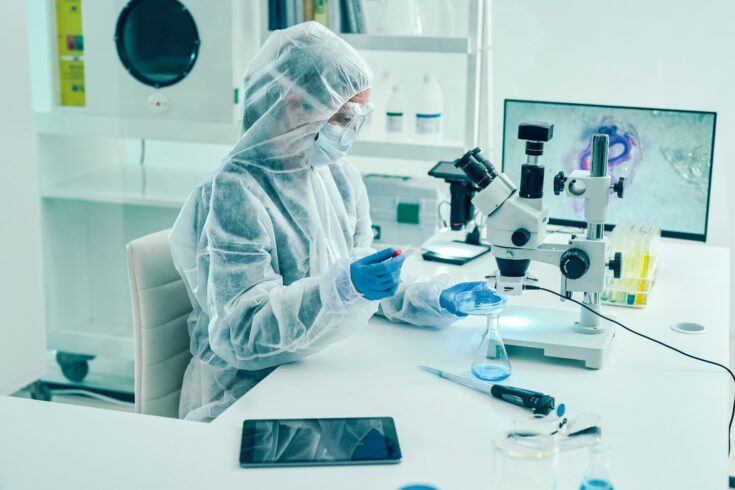The ambitious research will inform the development of new, broader and longer-lasting vaccines.
The funding is part of Tackling infections, one of UK Research and Innovation’s (UKRI) five strategic themes. These projects are just three of a number of investments in ways to investigate and better manage future infectious disease threats.
Creating the next generation of vaccines
Maria Caulfield, Minister for Vaccines and Public Health said:
As we continue to learn from the pandemic, creating the next generation of vaccines is crucial to protecting the most vulnerable and managing future threats.
These projects will enhance our understanding of infectious diseases, including Covid, and how our bodies react to equip us with the best tools to fight back.
Harnessing research and innovation
Dr Stephen Oakeshott, Medical Research Council Head of Infections and Immunity said:
UKRI’s Tackling Infections programme aims to harness research and innovation to fight against the threats posed by infectious diseases.
These UK wide partnerships will build on the research legacy from our response to the COVID-19 pandemic, allowing the UK’s leading experts to deepen our understanding of how SARS-CoV-2 might evolve and how we might protect against future variants.
We are committed to helping the country be better prepared for future pandemics and this important work will provide important insight for public health and illuminate a pathway for next-generation vaccine development.
Funded projects
The G2P2 virology consortium: keeping pace with SARS-CoV-2 variants
Led by Professor Wendy Barclay, Imperial College London
The G2P2 consortium will keep pace with the continually evolving variants of SARS-CoV-2. Combining the consortium’s skills in molecular virology, the project will track how genetic changes emerging in the virus affect phenotypes, including:
- the severity of illness the virus may cause
- the range of cell types it can infect
- how well it can evade the immune system
- how it is transmitted between people
This will provide an evidence base to inform whether updates to current vaccines are needed and inform changes in policy based on increased risk to population health.
IMMPROVE: Immune Memory and Mechanisms of Protection from Vaccines
Led by Professor Teresa Lambe OBE and Professor Paul Klenerman, University of Oxford
This new global collaborative project will further our understanding of how vaccines keep people safe. It will also answer why some people get infected even after vaccination and identifying if delivering vaccines to the mucosa (up the nose) may result in better protection.
Working with experts in the UK, low and middle-income countries, and with industry, researchers will use samples from clinical trials and experimental medicine to find out why some vaccines work better than others.
These data and learnings will help to not only make better vaccines against COVID-19, but also against other respiratory pathogens such as flu.
Ultimately, the project will help scientists to design, test and deliver vaccines that can protect the most vulnerable from disease.
Evolutionarily smart vaccine strain selection for proactive vaccinology
Led by Professor Derek Smith, University of Cambridge
This project aims to enhance the SARS-CoV-2 vaccine strain selection process to provide the best possible protection for the UK population.
It will predict which variants may emerge in the future and measure immune responses against this potential future evolution. This will enable researchers to choose the variant of the virus to use in the next vaccine.
This continual monitoring and updating of the variant is necessary to protect those at high-risk of complications from COVID-19 and who will require further vaccinations against the evolving virus.
Transforming Tomorrow Together
Through its five-year strategy ‘Transforming tomorrow together 2022 to 2027’, UKRI will harness the full power of the UK’s research and innovation system to tackle large-scale, complex challenges.
To do this, it has identified five strategic themes, building on the millions that UKRI has invested and designed to encourage working across disciplines and building on existing investment and activity.
Tackling infections will bolster our national defence and response capabilities by tackling infectious diseases that pose threats to people, livestock, crops and natural resources in more integrated and innovative ways. This will mean we’re better prepared for potential epidemics and can more effectively tackle antimicrobial resistance.
Our aim is to build knowledge and capability to better detect and disrupt the emergence and spread of infectious diseases and accelerate development of new vaccines and therapeutics. At the heart of this vision is our commitment to supporting world class discovery science and further understanding of disease.
Further information
About our strategic themes
Through our five-year strategy ‘Transforming tomorrow together’, UKRI aims to harness the full power of the UK’s research and innovation system to tackle large-scale, complex challenges.
To do this, we are investing £185 million in five themes which will tackle existential threats to humanity and encourage working across disciplines. These are:
- building a greener future
- building a secure and resilient world
- creating opportunities and improving outcomes
- health, ageing and wellbeing
- tackling infections
We will build on these funds through contributions from our councils and other funding partners, including government departments.

